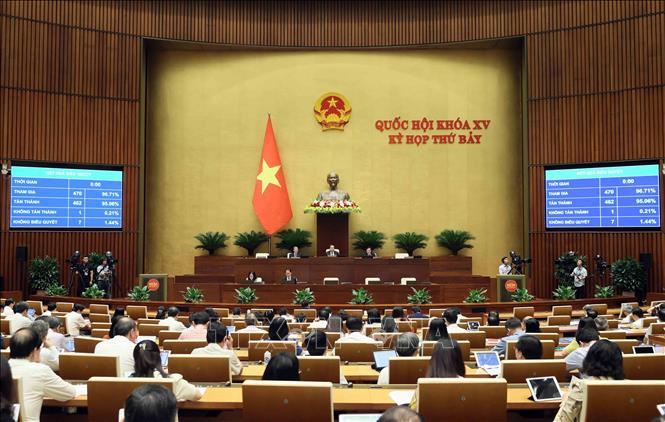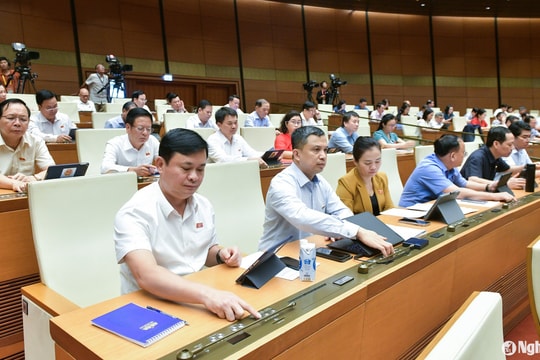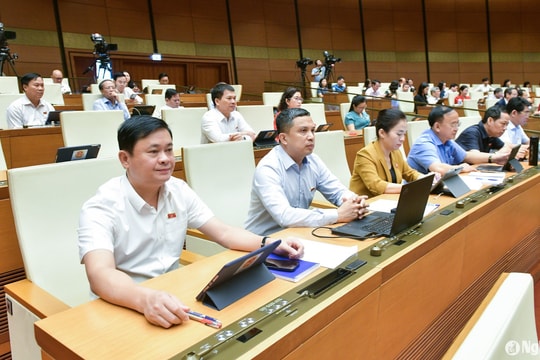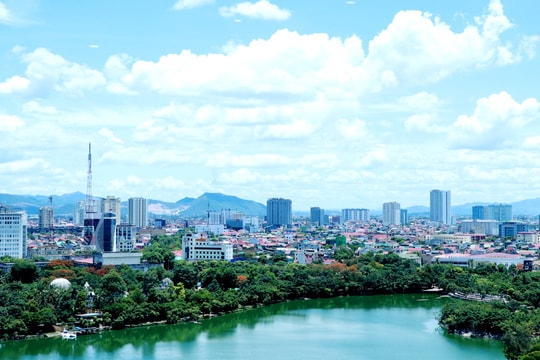The National Assembly passed the Law on the Capital (amended)
On the morning of June 28, with 462/470 National Assembly delegates present in agreement (accounting for 95.06% of the total number of delegates), the National Assembly passed the Law on the Capital (amended).

The Law on the Capital (amended) consists of 7 Chapters with 54 Articles, clearly defining the position and role of the Capital; policies and responsibilities for building, developing, managing and protecting the Capital. The Law takes effect from January 1, 2025, except for the case specified in Clause 2, Article 54, which takes effect from July 1, 2025.
Before voting for approval, the National Assembly listened to the Chairman of the National Assembly's Law Committee Hoang Thanh Tung present a Report on explanation, acceptance and revision of the draft Law on the Capital (amended). Based on the opinions of the National Assembly deputies, the draft Law was reviewed and revised in the direction of regulating the organizational structure and tasks and powers of the authorities at all levels in Hanoi city, not only in accordance with the provisions of the Law on the Capital but also the provisions of the Law on Organization of Local Government; supplementing the authority of the Ward People's Committee in deciding on contents that, according to the provisions of other legal documents, must be decided by the People's Council at the commune level or must be approved by the People's Council at the commune level before deciding or submitting to competent authorities for consideration and decision.
At the same time, along with regulations on decentralization and delegation of authority between levels of government of Hanoi city, the draft Law has added regulations on decentralization and delegation of authority of the Government, Prime Minister, ministries and branches to agencies of Hanoi city to concretize the policy of promoting decentralization and delegation of authority.
According to the Chairman of the Law Committee, regarding policies on construction, development, management, protection of the Capital and mobilization of resources for the development of the Capital, the National Assembly Standing Committee has received and revised regulations on management and use of land at river banks and floating banks on diked rivers, ensuring compliance with planning and requirements on flood prevention and control.
The National Assembly Standing Committee has also reviewed the cases that require urban renovation and beautification projects to ensure no duplication; abolished the regulation assigning the City People's Committee to organize the sale of old houses; and re-expressed the direction of assigning the People's Council to specify the conditions, order, and procedures for implementing urban renovation and beautification projects in the city. At the same time, the draft Law has added a regulation assigning the City People's Committee to specify the order and procedures for recognizing and revoking the decision to recognize high-quality educational institutions, the assessment, inspection, and ensuring the maintenance of the quality of high-quality educational institutions to ensure feasibility and strictness in the implementation process.
Regarding the policy for Hoa Lac High-Tech Park, the National Assembly Standing Committee has revised regulations related to the form of land allocation, land lease, authority to allocate land, land lease, and land management in Hoa Lac High-Tech Park to be both suitable for practice and connected with the provisions of the 2024 Land Law, avoiding causing too much disruption in this field in Hoa Lac High-Tech Park.
According to Mr. Hoang Thanh Tung, regarding controlled testing, the draft Law has been accepted and revised in the direction of: not allowing testing in areas that directly affect national defense and security, and the field of human gene modification and editing; setting out principles to limit groups of legal regulations that organizations and enterprises conducting controlled testing may be allowed not to apply, on that basis, the City People's Council will decide the scope of non-application of legal regulations in accordance with each specific project as well as the requirements and purposes of testing...
Regarding the regulations on applying measures to stop providing electricity and water services, the National Assembly Standing Committee has directed a thorough review and addition of cases applying this measure to overcome violations of the law on fire and explosion prevention and control in the city in the past; adding transitional regulations on the responsibility to supplement electricity and water service supply contracts signed before the effective date of this Law...
The Chairman of the Law Committee pointed out that since the Capital Law only stipulates specific mechanisms and policies, demonstrating strong decentralization for the Hanoi city government, in addition to this Law, the Capital is still subject to the regulation of other laws and documents in the overall legal system. Therefore, the National Assembly Standing Committee would like to acknowledge the dedicated, accurate and responsible opinions of the National Assembly deputies to continue to study and direct the review, amendment and supplementation of relevant laws, ordinances and resolutions to perfect the legal system in the coming time. At the same time, together with the Government, the Hanoi city government continues to thoroughly grasp the process of promulgating detailed regulations, guiding the implementation and organization of the implementation of the Capital Law.




.jpg)

